Text
Look forward to being a part of this event tomorrow
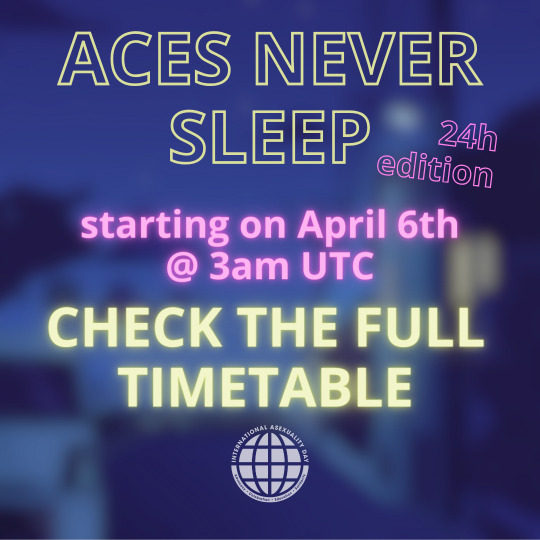
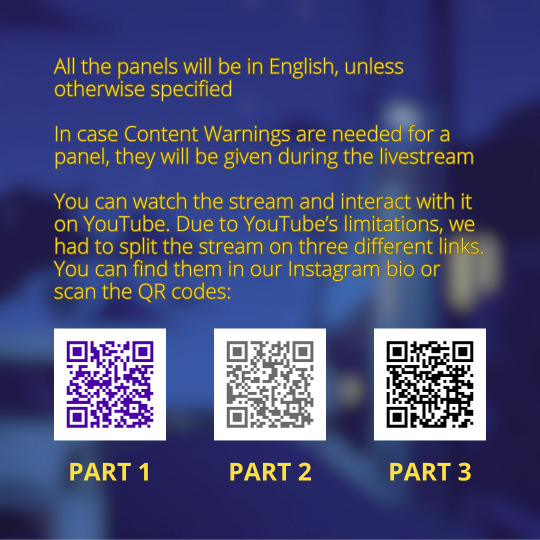
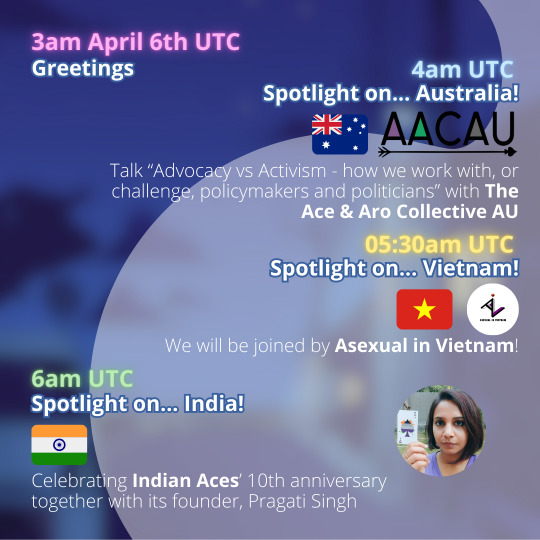
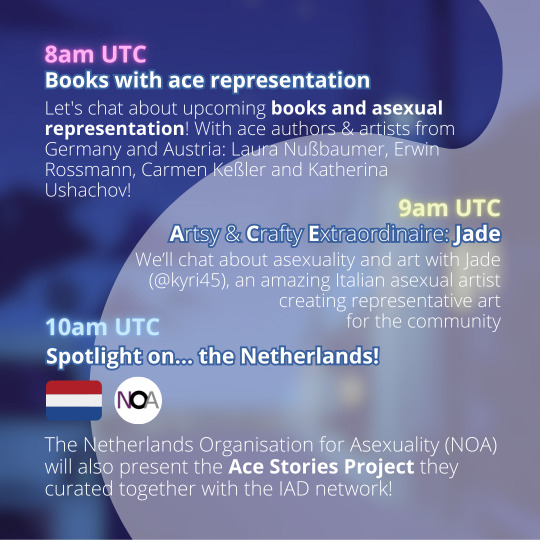

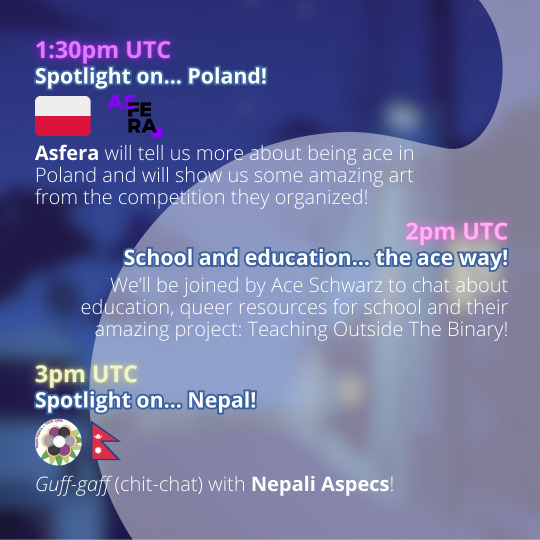

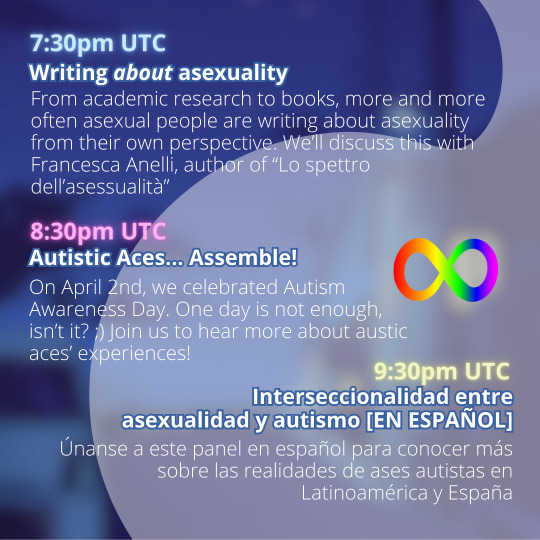
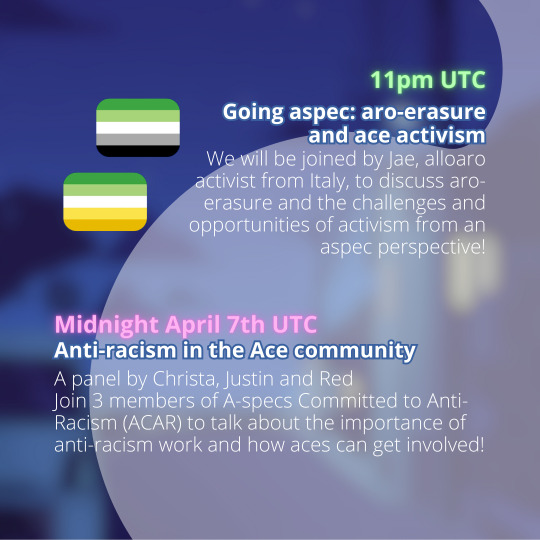

Better late than never, right?
We are excited to share with you the full list of panels for our 24h International Asexuality Day Livestream, which starts in… 7 hours!
You can access each of the segments of the stream through the QR codes on the second image, or simply by heading over to our YouTube channel when the panels begin
https://www.youtube.com/@InternationalAsexualityDay
We hope you'll join our amazing panelists from all around the world!
On this ocassion, given that IAD falls within Autism Awareness Week, we are not only highlighting the work of ace activists in different countries but we'll be also discovering a bit about the experiences of autistic aces in different parts of the world.
There will be asexual artists, activists, educators, writers… and so much more. Check it out!
All images contain Alt text for accessibility, although we will not have live captions for the event, unfortunately. We will work on getting subtitles for each stream segment after the IAD is over 💜
94 notes
·
View notes
Text
OMG thank you so much @fwoopersongs for sharing your thoughts on the book. really appreciate your perspective as a bilingual reader and fellow translator!
[Book Rec + Reaction/Thoughts] The Lantern and the Night Moths 灯与夜蛾 by Yilin Wang
An anthology of translated poems by five modern or contemporary poets and accompanying essays by the translator, @yilinwriter.
The cover art, a beautiful expression of the tone of this collection, is by Taiwanese artist Ciaoyin (check out her gorgeous insta!). I'm looking forward to the arrival of the physical book as my tab absolutely does not do it justice xD

Anyway! The official release date is 02 April 2024 though there have been some very thoughtful reviews by early readers already. Here, here and here.
(It was an ARC that I received too… though in the time it took to put this together, the ebooks have already gone out to readers >.< typical snail yj!)
Instead, I’ll tell you who I think would be be interested in this book or might benefit from reading it, then share things that are cool about it from the perspective of a bilingual hobbyist translator + lover of ancient poetry and lyrics.
Who should read it?
If annotations, translator’s notes and reflections spark joy for you...
If you’ve ever read poetry translations and been intensely curious about what goes on under the hood...
If you’re a translator yourself wanting to hear another voice...
Definitely check this out!
Also if you’re CN+EN bilingual and have ever read something in English that references Chinese terms and concepts etc. except ONLY in English, pinyin or wade-giles and been utterly frustrated by the ensuing guessing game (like me) Fear Not.
That will not be a problem here.
I really appreciate how Chinese words are used naturally where needed for concepts and quotes - they are also translated for those who can't read Chinese so no one is left out. It made this book of and about translation (and more) super comfortable to read! The solution is so simple, so direct, so rarely used that I am amused.
Oh, but do note that the Chinese characters are in simplified though!
The poems are organised by their writers who are listed here by order of birth year, not appearance in the book:
秋瑾 (Qiu Jin, 1875 to 1907)
废名 (Fei Ming. 1901 to 1967)
戴望舒 (Dai Wangshu, 1905 to 1950)
小西 (Xiao Xi, 1974 to _)
张巧慧 (Zhang Qiaohui, 1978 to _)
Altogether, that covers nearly the last 150 years up to now. I’ve never really been into poetry by poets in such relatively recent times, in part because I’d been holding on to this stereotype of them spurning Classical Chinese and ancient poetry in the first half of the 20th century (not entirely true, as I came to realise xD). It made sense and was understandable, but felt sad.
Yet am I the target audience for this book?
Very much so.
In ways I didn’t think I would be too! It was so much fun to experience this both as a reader and a translator that I thought I’d share it here, where we are appreciating Chinese poetry together.
If you didn’t think you’d enjoy modern Chinese poetry, hey, give it a chance!
Oh yeah - on the way home a while back, I was talking to a friend about translation and was surprised to hear that her impression was that it ought to be a straightforward process. Like isn’t it a 1:1 conversion? At some point, ‘what’s the difference between something google translate might return, and how you would say it?’ was asked, and oh that was a delightful question to my ears! I showed her one of my comparison sheets where an original text is laid out alongside multiple translations line-by-line, briefly explaining some common and unique choices and how the people who had translated those probably arrived at the various interpretations. She was pretty amazed to see that the answer to her question was: very different. Hey, it’s a complicated process!
But there’s only so much one can explain in the space of a train ride. That’s why The Lantern and the Night Moths is a book I would also rec to someone like this friend of mine - open minded and curious but never having the chance to think about or encounter the craft of translation.
Like Yilin says, ‘the meaning of a word cannot be fully expressed in one single translation, nor through a series of translation attempts’. She then explains why with great attention to detail and some solid examples from one of the poems with word choices loaded with subtle connotations :D
What's interesting about it?
Okay, for one, Yilin shared a playlist of music that she listened to while working on this book. Here is the link to the spotify one and the one on youtube. Check them out! They sure put me in the mood to read xD (favs: 别知己, 小神仙 & 去有風的地方) Afterwards, this made so much sense like - ah! an audio moodboard.
She's also putting together these adorable mini profiles of each poet along with a cmedia and tea rec to match their vibes. Check them out on her instagram xD
Now to business...
structure
What really helped keep the reader’s focus was the way each section is organized, how the poems and accompanying essay were presented and finally the short bio of each person right at the end.
The poets are first introduced through five or six of their poems. These works are well chosen. Their voices distinct through the vision, ambition and emotion of their words, are brought across by Yilin’s sensitive, thoughtful and poetic translations into English. These translations were also creative and transformative in a way that made so much sense after reading one of her reflections on the process, how she ‘must guide it with gentle hands to ensure its spirit is kept alive and intact during this transformative, and often excruciating process’. A rebirth into another language!
Personally, I’ve come to think of reading translations as looking at a work through another’s eyes. So it’s delightful when the translator’s presence is discernible, and even more so when the reader is given insight into their intention and process via commentary.
Yilin’s essays coupled with the poets’ bios at the end provide a means to go back and appreciate their works in context of their circumstance and inspirations. Similarly, to read the translations with a changed perspective.
I don’t know how much of a thing this is with translated poetry anthologies in English - can count the number I’ve read with both hands lol, and they’re all of the ancient chinese poetry variety - but I really like this design.
drawing on poets who came before them
Remember how we’re always recognizing traces of inspiration from ancient works (to them) in poetry of the various dynasties? 李商隐 Li Shangyin of Tang for example, was influenced by ��辞 Verses of Chu and folklore and mythology such as that in 山海经 Classic of Mountains and Seas, 李白 Li Bai frequently references poets and history of the 魏晋 Wei-Jin era, and 王维 Wang Wei was clearly familiar with Buddhist scriptures which were translations themselves!
Just like the late Táng poets whom he praised for boldly deviating from the voices before them, Fei Ming used popular references and tropey shorthands ‘in contexts utterly different from the original, reimagining them anew’. Dai Wangshu, too, ‘boldly re-envisioned what modern poetry could look like by revisiting the classics’. In fact, in his very relatable ‘To Answer the Visitor with Classical Imagery’, I see Li Bai’s 春夜宴桃李园序, Qu Yuan’s 离骚 and lots of - as the title says - classical imagery, as if pulling out painting after painting to describe a feeling.
And it’s Dai Wangshu’s faith in the translatability of poetry, that ‘poetry isn’t what is lost in translation, but rather, what survives it’ reminds me of what a friend, @xiakeponz, said that I agree with so much - because readers can ‘experience something in their own individual way through (your) shared humanity rather than language alone’.
poetic tradition and beyond
It’s between the lines of contemporary poets Zhang Qiaohui and Xiao Xi, that I can really see the charm of plain vernacular, how it can be beautiful, incisive and clever in turns. Even as it seems to have moved further than ever from the structure and language of literary Chinese, the themes that inspired common motifs remain a part of life. Mother and divinity, homesickness, finding oneself, tributes to admirable spirits and the issues that trouble society - just in a new form and with different ways of expression.
Qiu Jin
So many FEELINGS about what Qiu Jin was doing - ‘I awaken the spirits of women, hundreds of flowers, abloom’. I would love if she could see the world now. So many things for her to rouse and fight against, but at the same time just as many to be proud of. I am so in awe of her, but now hearing her loneliness and struggle there is a soft spot in my heart for those too.
conclusion
So so so…
Qiu Jin’s admirable fire and lonely resolve. Zhang Qiaohui’s precious ability to express beauty in the mundane and in pain. Fei Ming’s utter delight! He is having so much fun and when* I’m vibing, I feel it too. Xiao Xi’s critical eye and keen observation of the world. Dai Wangshu’s whimsical charm and passion for translation. Finally, Yilin Wang, the connecting thread wound through them all, bringing them together so that we may be acquainted.
*Reading his poetry is like unwrapping a seamless, many layered present. A gift that keeps giving - if only you have a key 😅 Fortunately, Yilin has halved our struggle 🤣
I’ve had such a great time with them all. And if you come, I hope you will too!
#The Lantern and the Night Moths#chinese poetry#poetry in translation#Dai Wangshu#Xiao Xi#Fei Ming#Zhang Qiaohui#Qiu Jin#translation#诗歌#翻译#文学#modern chinese poetry#modern chinese literature
28 notes
·
View notes
Text
thank you so much for the lovely review!
My review of @yilinwriter 's new book 'The Lantern and the Night Moths' is up! (SPOILER ALERT: I loved it!)
4 notes
·
View notes
Text
Mini Profile: Qiu Jin 秋瑾
For the month leading up to the launch of The Lantern and the Night Moths (officially releasing on April 2nd, 2024), my forthcoming book of translated Chinese poetry and essays on translation, I have decided to make mini-profiles for each of the five poets included in the anthology to help folks get to know the poets.
First up is Qiu Jin.
I am also including a c-drama and tea pairing per special request.
Let me know what you think in the comments. :)


#translation#cdrama#chinese poetry#poetry#Qiu Jin#women history month#cool chinese women#Sworn sisters#诗#tea#west lake
4 notes
·
View notes
Text
I have some new co-translations of Li Qingzhao's poetry out in Glyphoria, a publication created by Metatron.
Living in the Song dynasty, Li Qingzhao was China's most celebrated female poet. The poem I translated is my favourite poem of hers and touches on female friendship and sisterhood.

72 notes
·
View notes
Text
Kindred Spirits 知音: "The One Who Truly Understands Your Songs"
For #AroWeek, I want to talk about the Chinese term 知音 (pronounced zhīyīn in Mandarin), which has influenced my thinking about queerplatonic relationships.
zhī 知: to know, knowing
yīn 音: music, sound
literally, a zhīyīn is someone who "truly understands your songs"
the term zhīyīn comes from a story about finding a kindred spirit through music.
There are many versions of the story. Here's one version:
One day, the musician Yu Boya was playing a qin (see image) in the wilderness, when he met Zhong Ziqi.

When Boya played one song, Ziqi immediately understood it and described it as reflecting the mood of soaring mountains (高山). When Boya played another song, Ziqi also comprehended immediately and described it as creating the mood of flowing waters (流水).
Ziqi could understand all of Boya's songs. When Ziqi passed away, Boya felt so distressed that he destroyed his qin and never played it again. Boya thought of Ziqi as a "zhīyīn," and that term continues to be widely used to this day.
In a modern context, the term of "zhīyīn" is often translated into English as a soulmate, a kindred spirit, or a very close friend, but at its core, it's a term that refers to a type of intensely emotional, spiritual, and platonic connection with someone.
The original songs played by Boya have been long lost to the passage of time, but musicians and composers have tried to imagine what the songs might have sounded like.
There's even a recording of "Flowing Waters" (流水) included on the Voyager Golden Record, symbolically helping humankind search for a zhīyīn as it drifts around in outer space.
youtube
For me, as an aspec (demiromantic, biromantic, and asexual) Sino diaspora femme, the idea of zhīyīn offers me a way to think about the concept of queerplatonic relationships, given that it's very similar to the idea of a soulmate but without the necessary romantic connotations of the word in English.
The concept of zhīyīn is explored again and again in various Sinophone literature and popular media, from wuxia and xianxia c-dramas to poetry that alludes explicitly or indirectly to zhīyīn.
Folks who follow my work as a translator might know that I have been translating poems by Qiu Jin (1875-1907), one of China's most renowned feminist poets. She frequently wrote about her longing for a zhīyīn.
Some of my translations:
https://chinachannel.lareviewofbooks.org/2021/02/12/qiu-jin/
The concept of zhiyin also features prominently in my upcoming book of poetry translations, The Lantern and the Night Moths. I originally wrote this thread for Twitter but wanted to bring it here for #AroWeek.
Alloromantic folks, please take a moment to learn more about #AroWeek and support arospec creators. If you are arospec and found me via this tweet, please feel free to say hi!
128 notes
·
View notes
Text
I have some new co-translations of Li Qingzhao's poetry out in Glyphoria, a publication created by Metatron.
Living in the Song dynasty, Li Qingzhao was China's most celebrated female poet. The poem I translated is my favourite poem of hers and touches on female friendship and sisterhood.

72 notes
·
View notes
Text
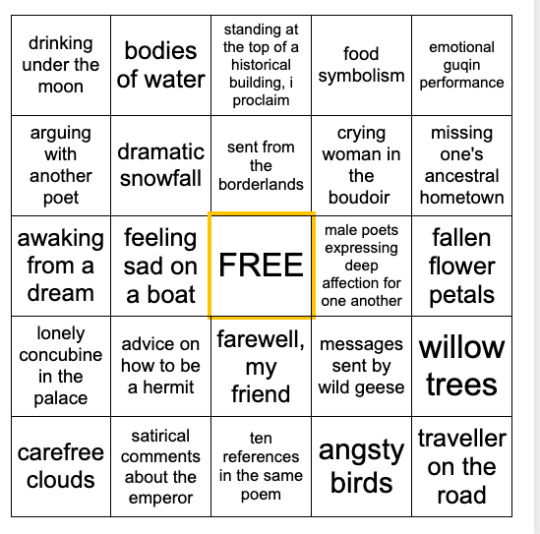
I made a Classical Chinese Poetry Bingo card to help people recognize the common tropes and motifs.🤣
These show up frequently in the modern poetry I translate as well.
Do you recognize anything from your readings or from pop culture? Tag yourself. I'm "feeling sad on a boat" lol
18 notes
·
View notes
Photo

Read ‘Sparrow’ by Yilin Wang
CLICK HERE TO GO TO CLARKESWORLD MAGAZINE.
3 notes
·
View notes
Text
2 notes
·
View notes
Text
2 notes
·
View notes
Text
2 notes
·
View notes
Text
4 notes
·
View notes
Text
Oh, this poor handkerchief made of merfolk-woven silk,
half stained with blood and half soaked in tears.
*
from “Reflections” by Qiu Jin (translated by Yilin Wang)
67 notes
·
View notes
Text
2 notes
·
View notes
Text
the british museum still acting insane in 2023 huh. anyway remind me to get this
13 notes
·
View notes